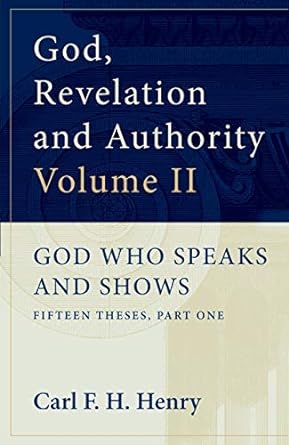A Brief Book Summary from Books At a Glance
by Steve West
About the Author
Carl F. H. Henry was one of the key thinkers and theologians of the evangelical movement in the 20th Century. God, Revelation and Authority is a seminal, multi-volume work of theological and philosophical engagement that has influenced and shaped evangelical thought for decades.
Table of Contents
Introduction: Divine Revelation: Fifteen Theses
Thesis One: A Supernatural Initiative
1. The Awesome Disclosure of God
Thesis Two: For Man’s Benefit
2. A Place in God’s Kingdom
3. Not by Good Tidings Alone
Thesis Three: Divine Transcendence
4. The Hidden and Revealed God
5. Self-Transcendence and the Image of God
Thesis Four: Coherent Disclosure
6. The Unity of Divine Revelation
Thesis Five: An Amazing Variety
7. The Varieties of Divine Revelation
8. Divine Revelation in Nature
9. The Rejection of Natural Theology
10. The Image of God in Man
11. Recent Conjectural Views of Revelational Forms
Thesis Six: God Names Himself
12. Divine Revelation as Personal
13. The Names of God
14. God’s Proper Names: Elohim, El Shaddai
15. God’s Proper Names: Yahweh
16. Jesus: The Revelation of the New Testament Name
Thesis Seven: Historical Revelation
17. Divine Revelation in History
18. The Leveling of Biblical History
19. Faith, Tradition and History
20. Revelation and History: Barth, Bultmann and Cullman
21. Revelation and History: Moltmann and Pannenberg
22. Revelation and History in Evangelical Perspective
Summary
THESIS ONE – Revelation is a divinely initiated activity, God’s free communication by which he alone turns his personal privacy into a deliberate disclosure of his reality.
Divine revelation comes from behind the eternal boundary that separates God from man. It shakes people and fills them with awe, as the transcendent God takes the initiative to reveal himself to finite creatures. Without God’s initiative in revelation, we could know nothing about him. No theologian could pierce into the nature of God without divine revelation. In pagan religion, the gods are comprehensible, and knowledge can be grasped through ritual and divination. In the biblical worldview, human beings do not unveil God: he must unveil himself. “The essence of revelation is that God steps outside of his hiddenness to disclose what would otherwise remain secret and unknown.” The church is called to prioritize the proclamation of the revealed Word of God in Scripture, and the pastor must be a preacher. Ethical and cultural issues are important to address, but only in connection with God’s Word.
The antipathy of modern thinking is nowhere more clearly seen than in its rejection of transcendent, divine revelation. Without the centrality of divine revelation, philosophical theology will fail. A philosophical case for theism cannot succeed without God’s revelation, since without revelation the concept of God will be conformed to any unrestrained speculation. As a result, every notion of God will be tolerated, while confidence in revealed truth will be considered intolerant dogmatism. Scripture, however, does not endorse the inclusion of every type of religious belief into a theological system. There is only one true living God, and he is the one who reveals himself. This revelation is clear, but people suppress their knowledge in unrighteousness. Although God’s self-disclosure often produced awe and wonder in the people, they needed to go further and respond in faith. Jesus performed signs, and God did signs and wonders, but faith moves past the signs to rest in God’s Word. False prophets can also perform miracles. . . .
[To continue reading this summary, please see below....]The remainder of this article is premium content. Become a member to continue reading.
Already have an account? Sign In
